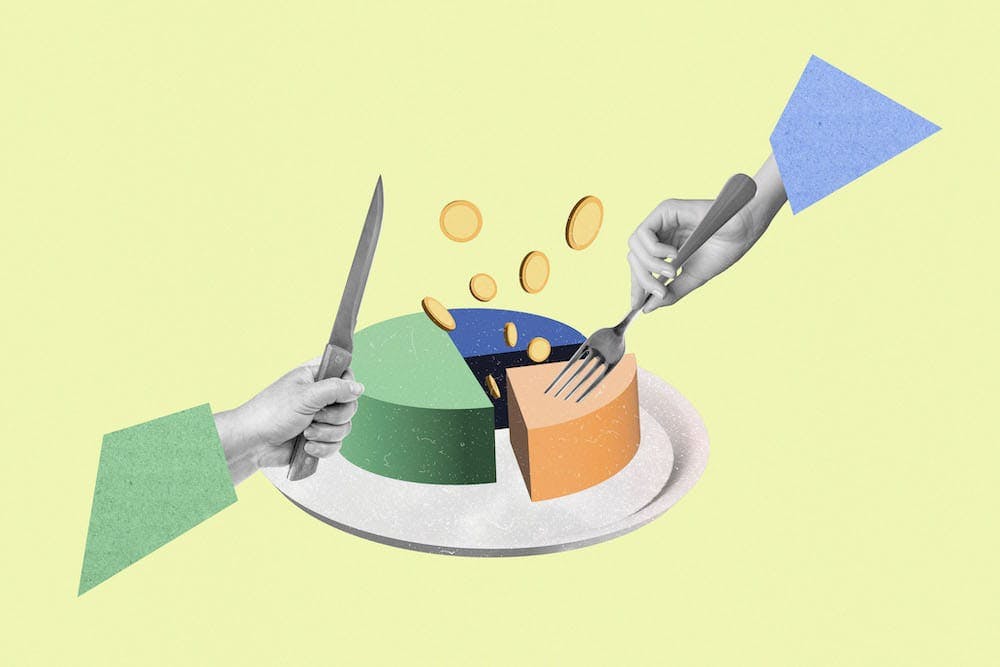How to start a conversation about money with your partner
updated on Feb 2, 2024

Wherever you are in your relationship, and whatever your finances are, use these tips for starting open and honest discussions about money
Talking about money can feel daunting at the best of times. Throw a romantic partner into the mix, and that feeling can get amplified – especially if you have feelings of discomfort when it comes to your finances. Research from Aviva found that financial stress is one of the leading causes of divorce in the UK, so it is essential to foster a supportive environment with your partner to discuss the matter of money, without blame, guilt, or resentment.
No matter what your financial status is, talking about money can certainly improve and deepen your relationship with your partner. So how can you get started with these conversations?
When you’re splitting the bill on a date
Dating and shared activities are cornerstones in a lot of relationships, and offer an immediate entry into money talk. For example, whether you’re in a long-term relationship, or it’s your very first date, splitting the bill is a hot topic. Do you split it 50/50, or just pay for what you had?
In a new relationship, you could suggest paying for different parts of the date. For example, one person pays for the cinema tickets, the other pays for drinks and snacks. Another suggestion you could make to your partner is to alternate paying for dates each time you go out.
If you’re in a longer-term partnership, you might wish to create a ‘kitty’, whether that’s in cash or in a shared bank account. You each contribute the same amount, and then pay for dates from that pot of money. That way, you are both splitting things reasonably equally.
If you have debt you want to tell them about
When it comes to talking about debt, you might be harbouring feelings of guilt or shame, and you might feel stressed about disclosing your debts to your partner. It can feel vulnerable to discuss your financial status, and we can sometimes, wrongly, attach our self-worth to our bank account. The reality is that the average credit card debt per person in the UK in 2023 is £1,202, according to Finder, while the average UK debt per person is £34,546. Clearly, it’s much more common than you might imagine, and your partner could even be in a similar position.
Be honest about how you’re feeling, ask for compassion and empathy, and acknowledge that you’re feeling uncomfortable, if that is the case. Be sure to structure the conversation, and try to determine what you’d like to get out of the chat beforehand. Is it support? Advice? Help creating a debt pay-off plan? End the conversation collaboratively, and discuss your shared goals for the future.

When you’re moving in together
If you’re moving in with a partner, it’s vital to have total transparency with one another. If you haven’t yet had the money chat, or you have and feel like you need to cover more ground, now is the opportune time to initiate that conversation.
Cohabiting means sharing rent or mortgage payments, splitting bills, and sharing your life together on a new level. It’s an exciting time, and you’ll find out new things about one another – from who leaves their socks on the floor to who forgets to buy toilet roll. You’ll probably also find out about your differences when it comes to your approach to money.
No two people in a couple will have the same opinions, thoughts, feelings, behaviours, and habits when it comes to money management. The important thing is to have respect for differences, and make sure that you are aligned on your shared goals.
When planning for your future
Planning a future, financially, with a partner is one of the most exciting things to do when it comes to money. Schedule some time in the calendar for a real-life money date, and discuss what you each want your future to look like. Is that early retirement? Part-time working? Big adventurous holidays? Now reverse engineer the steps of how you’ll get there. Think about what choices and actions you can make today to put your plans to work.
If you’re not sure yet about what you want your future to look like, ask yourself these questions: what do you value? What makes you feel fulfilled? When you know your partner’s answers to these intimate questions, it can give you a greater understanding of them, and their financial decisions (past and present), too.
Remember that many of us have been raised to believe that talking about money is taboo. Having more conversations about money with your partner is a journey. But if you can take steps to talk about finances regularly, it’s likely to pay off and your relationship will be stronger for it.

